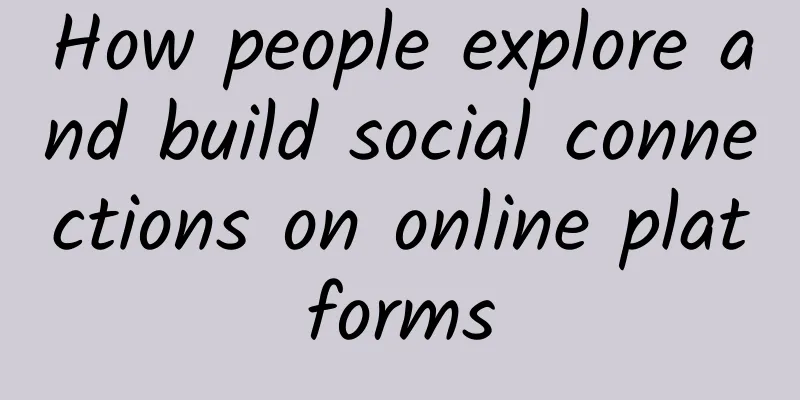How people explore and build social connections on online platforms

|
The COVID-19 pandemic is upending the social norms of the world. As people continue to adapt to this new normal, Facebook has also discovered some new consumer behaviors. One of the major evolutions is "connectivity and convenience". This macro shift shows that from social methods to payment methods, online platforms are increasingly showing humans' innate instinctive need for social connections. These digital connections not only bring more convenience to people's lives, but may also change people's social and shopping methods in the long run. 1. Redefine the social experience Whether it is work, study or entertainment, digital channels are essential for people to communicate during the epidemic: 53% of American respondents said that the Internet is an important tool they use during the epidemic. With the help of technology, people's stress caused by the inability to interact socially in close proximity has been alleviated. More than one-fifth (23%) of respondents worldwide said that they relieve stress through online communities. 40% of Americans say they miss physical intimacy more than emotional or spiritual closeness. So people are turning to activities that give them that feeling of intimacy, such as finding new joys in playing board games with family. While brands may not be able to provide a safe space for face-to-face communication offline, they can help alleviate loneliness and connect people through digital touchpoints to share quality time together and create a sense of belonging. ① Seeking solace in the gaming world For some people, the real world outside is always unpredictable, and the virtual world has become their "safe haven." Data shows that 82% of global respondents played video games and watched video game content during the COVID-19 pandemic. In addition to satisfying people's need to escape reality, the virtual world has become a new place for lively social interaction. For example, live concerts in games can easily attract millions of viewers. As people continue to explore digital shared experiences, brands that have the strength to occupy a front row position in the virtual world will gain more favor. ②Choosing online communication for health reasons When physical contact is potentially dangerous, experiencing healthcare providers remotely is a popular solution: The percentage of people in the U.S. using telehealth services increased from 11% in 2019 to 46% in 2020. As attitudes continue to shift, we’re likely to see more people using technology to expand their access to care. 2. Cashless Payment is the Way to Go Cash payments have been declining steadily for years. In 2017, bank cards replaced cash as the most common payment method in the UK. It is also predicted that half of Swedish retailers will stop accepting cash by 2025. The spread of the epidemic has greatly accelerated the transition to a cashless society. There are two main reasons for this. One is that people are worried about the spread of the virus through coins and banknotes. The other is the widespread popularity of e-commerce. Now that this kind of infrastructure has been established, it may become the norm to change cash checkouts to mobile payments. ① Consumers aged 65 and over prefer digital payments more than ever before The COVID-19 pandemic has prompted many people to turn to digital platforms for their daily needs, including older people who are sometimes hesitant to use these services. In May 2019, only 16% of people over 65 shopped online more than once a week, but after the outbreak of the COVID-19 pandemic, this figure has risen to 43%. By adopting a design that covers all ages, brands can help consumers navigate these online platforms more effectively and keep them engaged for a long time. ② People who rely on cash face the problem of not being able to keep up with the digital payment era While cashless societies are already taking shape in some parts of the world, the shift is not universal. Cash payments still dominate in large economies like Brazil and Japan, while as many as 1.7 billion adults worldwide do not have a bank account. As more payments are made digitally, brands must think carefully about how to promote financial inclusion, or they risk neglecting those who rely on cash. In response, mobile-first fintech solutions have the potential to close the gap in regions where digital payment infrastructure is not yet widespread. The PDF version will be shared on 199IT Knowledge Planet, just scan the QR code below! |
Recommend
How is uterine prolapse surgery performed?
If uterine prolapse reaches the third degree, man...
How to take care of skin when girls stay up late
It is girls’ nature to love beauty. Nowadays, man...
Can eating papaya after childbirth make your breasts bigger?
Many postpartum women will experience sagging or ...
[Creative Cultivation Program] What should I do if I miss taking my medicine when I am old and my memory is poor? Should I take double the dose? A brief explanation of various commonly used medicines
Author: Li Jin As people age, many middle-aged an...
I had sex 3 times in 43 days after hysterectomy
Under normal circumstances, it is recommended to ...
Which is more serious, a dry cough or a wet cough? Besides colds, what else can cause coughing?
In addition to being caused by colds and other di...
Treatment for cold belly in pregnant women
We all know that life is very difficult for every...
Symptoms of mycoplasma infection in girls
Mycoplasma infection in girls is relatively rare ...
How to treat severe anemia? Eat these to stay away from anemia
Due to women's special physiological conditio...
Pain in women's vagina when urinating
If a woman feels pain when urinating, has frequen...
What causes postpartum groin pain?
Groin pain is a relatively common health problem,...
What is the reason for frequent uterine contractions at 33 weeks of pregnancy?
When a woman is 33 weeks pregnant, she has one or...
What to do if you are pregnant with pulmonary artery stenosis
Some pregnant women have pulmonary artery stenosi...
Menstruation is delayed for one day and one is dark and one is shallow
If a woman does not use proper contraceptive meth...
What to do if your breasts sag and expand outwards
As women age, they will find that their bodies ch...









